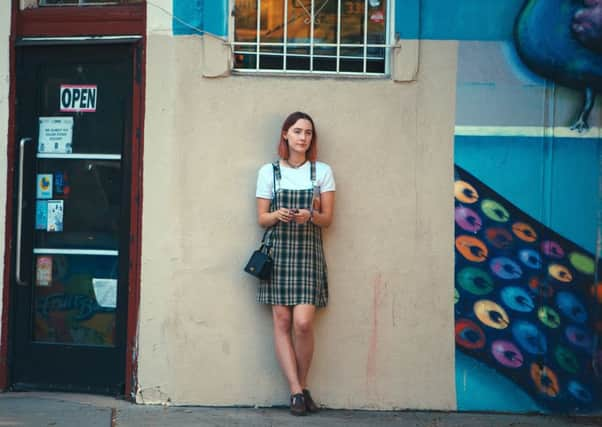Film reviews: Lady Bird | Black Panther | 50 Shades Freed


Lady Bird (15) ****
Black Panther (12A) ***
50 Shades Freed (18) *
Late on in Greta Gerwig’s funny, joyous and perceptive coming-of-age film Lady Bird, a character points out that closely observing something and loving something might be the same thing. The conversation in question is in reference to a school essay the film’s self-named heroine, Christine “Lady Bird” McPherson, has written about her hometown of Sacramento – an apparent cultural backwater from which this desperate-to-reinvent-herself adolescent is intent on escaping. Gerwig grew up there too, and given the meticulous way she’s recreated the life of a Sacramento teenager circa 2002, this moment feels like her own sly way of acknowledging the complicated, increasingly affectionate relationship anyone can have with somewhere the more perspective they get on it. But it’s also a way of understanding the antagonistic relationship Saoirse Ronan’s Lady Bird has with Laurie Metcalf’s Marion, her harassed but attentive mother, whose constant criticism is, in Lady Bird’s myopic view at least, the spark that keeps igniting their already combustible bond.
Taking place over an 18-month period encapsulating Lady Bird’s final year of high school and her first few weeks of college, the film itself offers a fabulously witty and wise spin on all the expected teen movie beats. Yet it’s Gerwig’s decision to make the mother-daughter relationship the driving force of the narrative that really makes it special. In her first solo outing as a writer/director (she previously co-directed 2008’s mumblecore drama Nights and Weekends with Joe Swanberg), Gerwig demonstrates a masterful ability to embrace Lady Bird’s adolescent self absorption while also subtly zooming out to give Marion’s life almost equal consideration, generating empathy not just enmity. As a filmmaker she’s fully attuned, for instance, to the way class and money underpin much of the frustration felt by both characters and finds all kinds of ways to articulate the family’s precarious financial position without getting all polemical about it.
Advertisement
Hide AdAll of which roots the comedy in something real, which in turn makes the humour feel more organic and more relatable. It also helps that it’s so well cast. Gerwig remains behind the camera, but she’s found an ideal lead in Ronan and neither attempt to idealise the character. Metcalf – recalling her role in groundbreaking US sitcom Roseanne – is a superb foil for Lady Bird’s teen angst and there’s great support from up-and-coming stars Lucas Hedges and Timothée Chalamet. There’s a lovely irony too in the fact that Lady Bird, like all teenagers, wishes she could live through something, yet this unassuming, multi-Oscar-nominated film is having quite the moment itself thanks to its arrival at a time in which the movie industry is undergoing a long-overdue reckoning with its treatment of women on screen and off. That might have unexpectedly politicised the movie, but that’s also part of its charm. The more scrutiny it comes under, the more love comes its way.
It’s been 20 years since Blade quietly kick-started the current multiplex dominance of comic book movies. Shockingly – though not surprisingly – it’s taken precisely this long for Marvel to give another of its characters of colour a franchise of their own. Having been introduced in Avengers: Civil War, Black Panther grants the eponymous superhero (played once again by Chadwick Boseman) an epic origins story, one that weaves references to slavery, colonialism and the failures of the Civil Rights movement into a pulpy comic book adventure full of family betrayal, Bond-style gadgetry and overblown action. Visually, director Ryan Coogler (Creed) may struggle to transcend the murky CGI fakery that seems to have become the Marvel house style (it’s particularly ugly in IMAX 3D), but he’s put his stamp on it in terms of the casting and the agency he’s given characters more usually consigned to background players in these sorts of films. Set largely in the fictional African nation of Wakanda – a country that itself has a bit of a superhero identity (it exploits its global status as a developing nation to conceal a thriving technocratic society) – the film revolves around Boseman’s royal heir T’Challa as his ascendency to the throne is challenged by a vengeful American cousin he never knew he had (he’s played by Coogler regular Michael B Jordan). Both are commanding leads, but it’s the supporting cast – Oscar-winner Lupita Nyong’o as a spy for whom T’Challa clearly pines; Danai Gurira as his most fearsome protector; Get Out’s Daniel Kaluuya as his more radically minded best friend and, especially, Letitia Wright as his super-smart Q-esque sister – who steal the show and continue to generate interest when the dreary slam-bang action inevitably takes over.
The 50 Shades franchise draws to a close in typically tedious fashion with 50 Shades Freed, a film whose title perhaps reflects the relief felt by stars Dakota Johnson and Jamie Dornan now that their contractual obligations to this lucrative but silly series have finally been fulfilled. They return as Anastasia Steele and Christian Grey, newly wed and coming to the realisation that their BDSM proclivities symbolically parallel the demands of modern marriage and the strictures of imminent parenthood. OK, not really. Though matrimony issues and pregnancy feature prominently, the film – which, like the previous instalment, has been adapted by 50 Shades creator EL James’s husband, Niall Leonard, and directed with similar yes-man compliance by 50 Shades Darker’s James Foley – forgoes any interest in the psychological underpinnings of the characters in favour of an ineffectually executed thriller plot and sex-scenes with all the daring of a 1990s Häagen-Dazs ad. ■